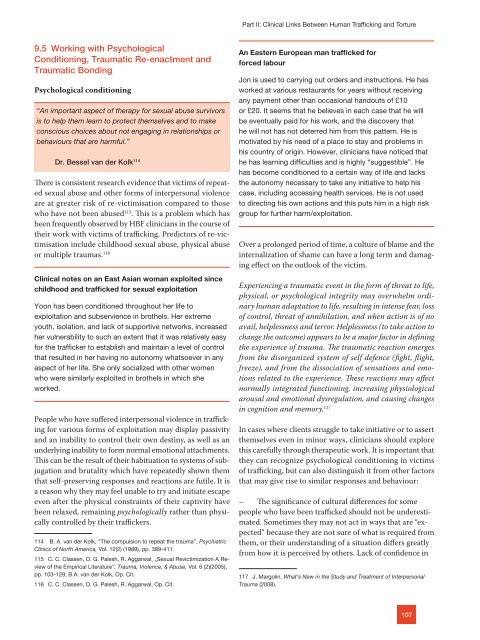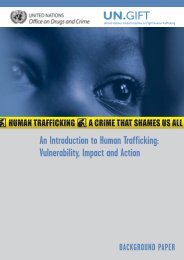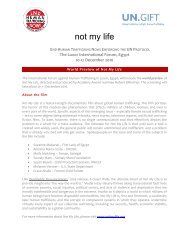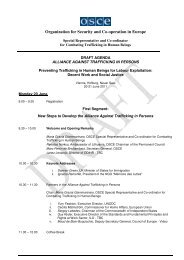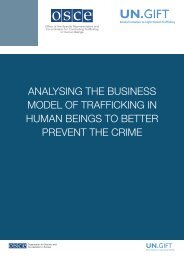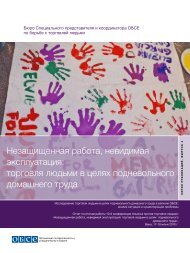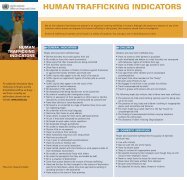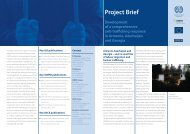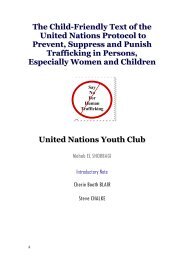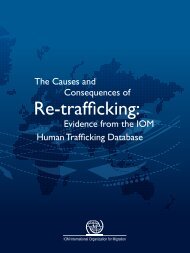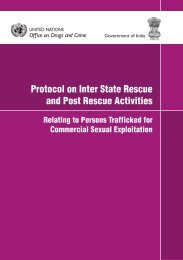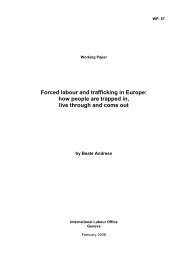Trafficking in Human Beings Amounting to Torture and other Forms ...
Trafficking in Human Beings Amounting to Torture and other Forms ...
Trafficking in Human Beings Amounting to Torture and other Forms ...
You also want an ePaper? Increase the reach of your titles
YUMPU automatically turns print PDFs into web optimized ePapers that Google loves.
9.5 Work<strong>in</strong>g with Psychological<br />
Condition<strong>in</strong>g, Traumatic Re-enactment <strong>and</strong><br />
Traumatic Bond<strong>in</strong>g<br />
Psychological condition<strong>in</strong>g<br />
“An important aspect of therapy for sexual abuse survivors<br />
is <strong>to</strong> help them learn <strong>to</strong> protect themselves <strong>and</strong> <strong>to</strong> make<br />
conscious choices about not engag<strong>in</strong>g <strong>in</strong> relationships or<br />
behaviours that are harmful.”<br />
Dr. Bessel van der Kolk 114<br />
There is consistent research evidence that victims of repeated<br />
sexual abuse <strong>and</strong> <strong>other</strong> forms of <strong>in</strong>terpersonal violence<br />
are at greater risk of re-victimisation compared <strong>to</strong> those<br />
who have not been abused 115 . This is a problem which has<br />
been frequently observed by HBF cl<strong>in</strong>icians <strong>in</strong> the course of<br />
their work with victims of traffick<strong>in</strong>g. Predic<strong>to</strong>rs of re-victimisation<br />
<strong>in</strong>clude childhood sexual abuse, physical abuse<br />
or multiple traumas. 116<br />
Cl<strong>in</strong>ical notes on an East Asian woman exploited s<strong>in</strong>ce<br />
childhood <strong>and</strong> trafficked for sexual exploitation<br />
Yoon has been conditioned throughout her life <strong>to</strong><br />
exploitation <strong>and</strong> subservience <strong>in</strong> brothels. Her extreme<br />
youth, isolation, <strong>and</strong> lack of supportive networks, <strong>in</strong>creased<br />
her vulnerability <strong>to</strong> such an extent that it was relatively easy<br />
for the trafficker <strong>to</strong> establish <strong>and</strong> ma<strong>in</strong>ta<strong>in</strong> a level of control<br />
that resulted <strong>in</strong> her hav<strong>in</strong>g no au<strong>to</strong>nomy whatsoever <strong>in</strong> any<br />
aspect of her life. She only socialized with <strong>other</strong> women<br />
who were similarly exploited <strong>in</strong> brothels <strong>in</strong> which she<br />
worked.<br />
People who have suffered <strong>in</strong>terpersonal violence <strong>in</strong> traffick<strong>in</strong>g<br />
for various forms of exploitation may display passivity<br />
<strong>and</strong> an <strong>in</strong>ability <strong>to</strong> control their own dest<strong>in</strong>y, as well as an<br />
underly<strong>in</strong>g <strong>in</strong>ability <strong>to</strong> form normal emotional attachments.<br />
This can be the result of their habituation <strong>to</strong> systems of subjugation<br />
<strong>and</strong> brutality which have repeatedly shown them<br />
that self-preserv<strong>in</strong>g responses <strong>and</strong> reactions are futile. It is<br />
a reason why they may feel unable <strong>to</strong> try <strong>and</strong> <strong>in</strong>itiate escape<br />
even after the physical constra<strong>in</strong>ts of their captivity have<br />
been relaxed, rema<strong>in</strong><strong>in</strong>g psychologically rather than physically<br />
controlled by their traffickers.<br />
114 Psychiatric<br />
Cl<strong>in</strong>ics of North America, <br />
-<br />
”, Trauma, Violence, & Abuse,<br />
<br />
<br />
An Eastern European man trafficked for<br />
forced labour<br />
Jon is used <strong>to</strong> carry<strong>in</strong>g out orders <strong>and</strong> <strong>in</strong>structions. He has<br />
worked at various restaurants for years without receiv<strong>in</strong>g<br />
any payment <strong>other</strong> than occasional h<strong>and</strong>outs of £10<br />
or £20. It seems that he believes <strong>in</strong> each case that he will<br />
be eventually paid for his work, <strong>and</strong> the discovery that<br />
he will not has not deterred him from this pattern. He is<br />
motivated by his need of a place <strong>to</strong> stay <strong>and</strong> problems <strong>in</strong><br />
his country of orig<strong>in</strong>. However, cl<strong>in</strong>icians have noticed that<br />
he has learn<strong>in</strong>g difficulties <strong>and</strong> is highly “suggestible”. He<br />
has become conditioned <strong>to</strong> a certa<strong>in</strong> way of life <strong>and</strong> lacks<br />
the au<strong>to</strong>nomy necessary <strong>to</strong> take any <strong>in</strong>itiative <strong>to</strong> help his<br />
case, <strong>in</strong>clud<strong>in</strong>g access<strong>in</strong>g health services. He is not used<br />
<strong>to</strong> direct<strong>in</strong>g his own actions <strong>and</strong> this puts him <strong>in</strong> a high risk<br />
group for further harm/exploitation.<br />
Over a prolonged period of time, a culture of blame <strong>and</strong> the<br />
<strong>in</strong>ternalization of shame can have a long term <strong>and</strong> damag<strong>in</strong>g<br />
effect on the outlook of the victim.<br />
Experienc<strong>in</strong>g a traumatic event <strong>in</strong> the form of threat <strong>to</strong> life,<br />
physical, or psychological <strong>in</strong>tegrity may overwhelm ord<strong>in</strong>ary<br />
human adaptation <strong>to</strong> life, result<strong>in</strong>g <strong>in</strong> <strong>in</strong>tense fear, loss<br />
of control, threat of annihilation, <strong>and</strong> when action is of no<br />
avail, helplessness <strong>and</strong> terror. Helplessness (<strong>to</strong> take action <strong>to</strong><br />
change the outcome) appears <strong>to</strong> be a major fac<strong>to</strong>r <strong>in</strong> def<strong>in</strong><strong>in</strong>g<br />
the experience of trauma. The traumatic reaction emerges<br />
from the disorganized system of self defence (fight, flight,<br />
freeze), <strong>and</strong> from the dissociation of sensations <strong>and</strong> emotions<br />
related <strong>to</strong> the experience. These reactions may affect<br />
normally <strong>in</strong>tegrated function<strong>in</strong>g, <strong>in</strong>creas<strong>in</strong>g physiological<br />
arousal <strong>and</strong> emotional dysregulation, <strong>and</strong> caus<strong>in</strong>g changes<br />
<strong>in</strong> cognition <strong>and</strong> memory. 117<br />
In cases where clients struggle <strong>to</strong> take <strong>in</strong>itiative or <strong>to</strong> assert<br />
themselves even <strong>in</strong> m<strong>in</strong>or ways, cl<strong>in</strong>icians should explore<br />
this carefully through therapeutic work. It is important that<br />
they can recognize psychological condition<strong>in</strong>g <strong>in</strong> victims<br />
of traffick<strong>in</strong>g, but can also dist<strong>in</strong>guish it from <strong>other</strong> fac<strong>to</strong>rs<br />
that may give rise <strong>to</strong> similar responses <strong>and</strong> behaviour:<br />
– The significance of cultural differences for some<br />
people who have been trafficked should not be underestimated.<br />
Sometimes they may not act <strong>in</strong> ways that are “expected”<br />
because they are not sure of what is required from<br />
them, or their underst<strong>and</strong><strong>in</strong>g of a situation differs greatly<br />
from how it is perceived by <strong>other</strong>s. Lack of confidence <strong>in</strong><br />
What’s New <strong>in</strong> the Study <strong>and</strong> Treatment of Interpersonal<br />
Trauma<br />
107


